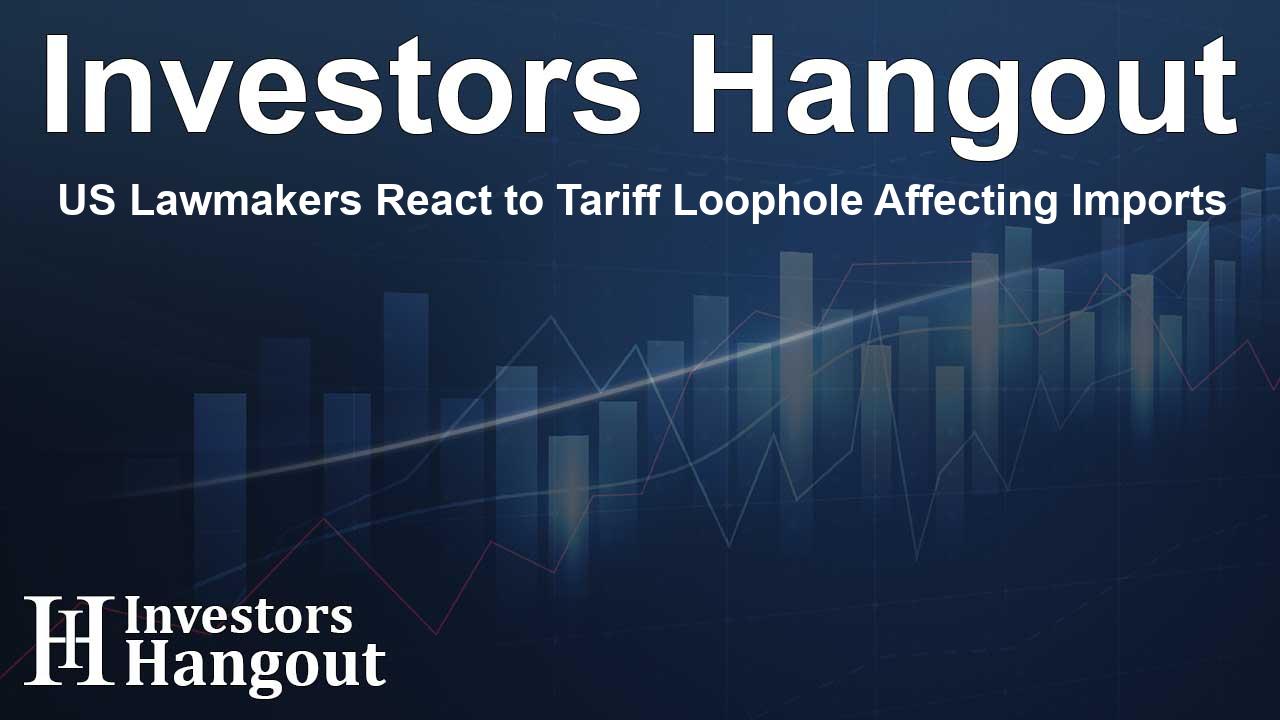US Lawmakers React to Tariff Loophole Affecting Imports

Lawmakers Urge Closure of Tariff Loophole
A significant number of Democratic representatives from the U.S. House have reached out to President Joe Biden, pressing for action to close what they consider a blatant tariff loophole. This loophole impacts low-value package imports, which they argue are being misused by Chinese e-commerce companies as well as those trafficking in fentanyl.
Understanding the De Minimis Provision
The lawmakers shared their concerns through a formal letter, asking Biden to use his executive power to do away with the 'de minimis' regulation. This rule permits imports valued at less than $800 to enter the U.S. without facing tariffs or thorough customs inspections, as long as they are sent to individuals.
Effect on E-Commerce
This tariff exemption has spurred remarkable growth in Chinese e-commerce platforms like Shein and Temu, which efficiently ship products directly to consumers in America. Mainstream retailers such as Amazon and Walmart have also been taking advantage of this loophole. This small-package exemption has been part of U.S. trade law dating back to 1930, and the limit was raised from $200 to $800 in 2015.
Lawmakers' Concerns
Among those leading this initiative are representatives like Earl Blumenauer, Rosa DeLauro, and Tom Suozzi. They argue that the misuse of the de minimis policy is tied to the trafficking of dangerous opioids, including fentanyl and its precursors. They stress the serious risks it poses to public health, pointing out that people continue to be harmed by fentanyl-laced pills that slip past inspections due to this loophole.
Economic and Security Threats
The lawmakers emphasized that allowing these imports to bypass traditional oversight not only endangers public health but also sidesteps essential U.S. trade enforcement measures. This includes critical regulations like the Uyghur Forced Labor Prevention Act and the Section 301 tariffs aimed at curbing unfair trade practices.
Manufacturers Respond
The National Council of Textile Organizations, which advocates for domestic manufacturers, has also voiced its concerns. They argue that de minimis shipments from fast-fashion retailers, like Shein, have been dodging the hefty Section 301 tariffs applied to various Chinese textile imports. This avoidance is said to have contributed to the closure of around 18 U.S. manufacturing plants in just the past year.
Surge in Imports
There’s been a staggering increase in shipments, with over 4 million packages entering the U.S. every day under this threshold. In fact, the overall estimated value of these low-value imports has more than doubled since 2014, reaching $23.4 billion last year, making it the 12th largest category of U.S. imports worldwide.
Response from the Administration
Shipments from China alone have surged to $4.6 billion during this timeframe, ranking it as the eighth largest import category, just behind computer monitors. While lawmakers are eager to discuss closing this de minimis provision with the administration, there has been no immediate comment from a White House spokesperson regarding their request.
Impact on Consumers
The National Foreign Trade Council, which represents a diverse range of American businesses, has raised concerns about potential negative impacts on consumers if the de minimis loophole is closed. They warn that this could lead to increased costs for consumers, especially given the current inflationary environment as the presidential election approaches.
Final Thoughts
John Pickel, senior director of supply chain at the NFTC, indicated that altering the de minimis framework could lead to higher expenses for consumers and require more funding for Customs and Border Protection. However, this change might not ensure better enforcement or enhance security at ports. This complicated situation reflects broader discussions about regulation, trade, and public safety as lawmakers strive to find a solution to these complex issues.
Frequently Asked Questions
What is the de minimis provision?
The de minimis provision allows low-value packages valued under $800 to enter the U.S. without facing tariffs or customs inspections.
Why are lawmakers concerned about this loophole?
They believe it’s being misused by e-commerce companies and traffickers, particularly in connection to the fentanyl crisis that poses risks to public health.
How have Chinese e-commerce firms benefitted?
Companies like Shein and Temu have utilized this loophole to boost their sales and expand their presence in the U.S. market.
What impact could closing the loophole have on consumers?
Experts warn that it could lead to higher prices for consumers, especially during times of inflation.
What actions are lawmakers taking?
Lawmakers are urging President Biden to take executive action to close this loophole and are in the process of drafting legislation to address the issue.
About The Author
Contact Ryan Hughes privately here. Or send an email with ATTN: Ryan Hughes as the subject to contact@investorshangout.com.
About Investors Hangout
Investors Hangout is a leading online stock forum for financial discussion and learning, offering a wide range of free tools and resources. It draws in traders of all levels, who exchange market knowledge, investigate trading tactics, and keep an eye on industry developments in real time. Featuring financial articles, stock message boards, quotes, charts, company profiles, and live news updates. Through cooperative learning and a wealth of informational resources, it helps users from novices creating their first portfolios to experts honing their techniques. Join Investors Hangout today: https://investorshangout.com/
The content of this article is based on factual, publicly available information and does not represent legal, financial, or investment advice. Investors Hangout does not offer financial advice, and the author is not a licensed financial advisor. Consult a qualified advisor before making any financial or investment decisions based on this article. This article should not be considered advice to purchase, sell, or hold any securities or other investments. If any of the material provided here is inaccurate, please contact us for corrections.
